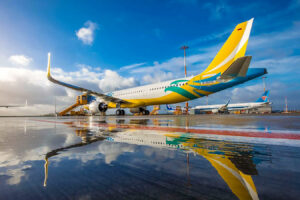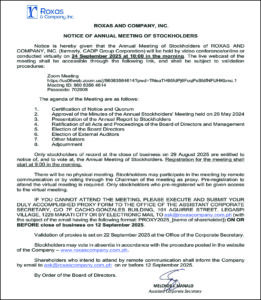CEBU AIR, INC. (CEB), the operator of budget carrier Cebu Pacific, saw its second-quarter (Q2) attributable net income surge to P8.51 billion, rising nearly sevenfold, driven by higher passenger revenue during the period.
“These results for the second quarter and first half of 2025 reflect the returns from our strategic investments in fleet and network expansion along with the sustained demand for air travel,” Cebu Air Chief Executive Officer Michael B. Szucs said in a statement on Wednesday.
The budget airline recorded second-quarter revenue of P32.91 billion, rising by 25.9% from the P26.14 billion generated in the same period last year.
Broken down, passenger revenue rose by 29.24% to P23.07 billion from P17.85 billion last year; revenues from the cargo business went up by 31.88% to P1.82 billion from P1.38 billion; and ancillary revenues grew by 16.23% to P8.02 billion from P6.9 billion previously.
“With the Philippines’ growing economy, favorable demographics and expanding tourism sector, we remain well positioned to drive long term growth in low-cost travel,” Mr. Szucs said.
For the April-to-June period, Cebu Pacific carried seven million passengers, marking a 16% increase from last year, driven by both its domestic and international networks.
The budget airline’s domestic traffic climbed 14% to more than five million, while its international traffic rose by 23% to 1.8 million, Cebu Pacific said, noting that its passenger growth was driven by the holiday season in recent months.
For the January-to-June period, Cebu Air’s attributable net income more than doubled to P8.97 billion from P3.55 billion in the comparable period in 2024.
The company’s gross revenue for the first half increased by 23.11% to P63.33 billion from P51.44 billion a year ago. Over the six months ended June, passenger revenues accounted for the majority of its topline at P44.23 billion, while cargo revenues and ancillary revenues generated P3.51 billion and P15.59 billion, respectively.
Cebu Pacific attributed its earnings growth to the increase in flights and available seats, driven by its shift to a sustainable-fuel and higher-capacity fleet.
Currently, Cebu Pacific operates more than 3,300 flights weekly across 124 routes with a fleet of 99 aircraft. In 2024, Cebu Pacific finalized a P1.4-trillion ($24 billion) order with Airbus SE for up to 152 aircraft.
Cebu Pacific expects seven more deliveries this year, after receiving its first aircraft for 2025 in March. The carrier is projected to operate a fleet of 100 aircraft by yearend.
At the stock exchange, shares in Cebu Air gained P1.30, or 3.55%, to close at P37.90 each. — Ashley Erika O. Jose






